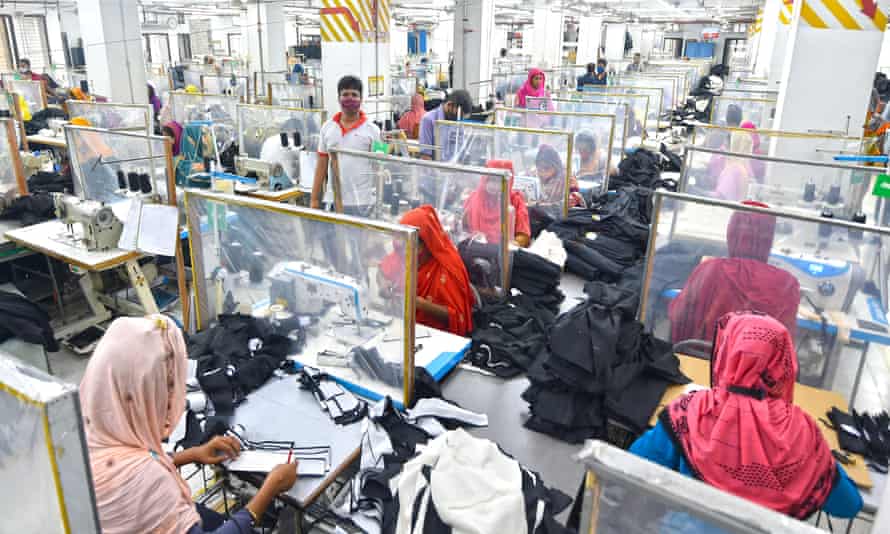Campaigners and union leaders praise accord, which replaces one agreed after 2013 Rana Plaza fire

A garment factory in Dhaka, Bangladesh.
Photograph: Xinhua/Rex/Shutterstock
Global development is supported by

Lauren Cochrane
Thu 26 Aug 2021 13.40 BST
Campaigners have hailed a new agreement designed to protect garment workers in Bangladesh, signed by the likes of H&M and Inditex, which owns Zara and Bershka.
The accord replaces another agreement signed by more than 200 international fashion companies after the Rana Plaza factory fire in 2013, in which more than 1,100 people died. For the first time, these companies faced legal action if their health and safety standards were found lacking or if they did not address problems in an agreed time period. More than 38,000 inspections have been carried out since 2013, and nearly 200 factories have lost their contracts owing to poor safety standards.
That agreement is due to expire at the end of August, and the negotiations for the new pact were protracted. Union leaders were concerned that the legally binding elements were being threatened and that improvements in conditions, wages and safety made since 2013 would be undermined, along with campaigns to improve safety in garment factories beyond Bangladesh.
The new agreement, which is managed by the Ready-Made Garments Sustainability Council (RSC), is valid until October 2023. Companies signing up commit to expanding general health and safety for workers beyond fire and building safety, human rights due diligence along supply chains, and making the same commitment to garment workers in at least one other country. Signatories have agreed to meet in six months’ time to discuss which countries, with the aim of making changes within two years.
Campaigners and union leaders praised the deal. Ayesha Barenblat, the chief executive of the ethical fashion advocacy group Remake, told the Business of Fashion: “This, I think, is truly a model of building back better.”
Valter Sanches, the general secretary of IndustriALL Global Union, said: “This international accord is an important victory towards making the textile and garment industry safe and sustainable.”
The full list of companies signing on will be revealed on 1 September.
Bangladesh has the third-largest garment industry after China and Vietnam. In 2019 it was estimated there were about 4,000 factories and 4 million workers, and the industry represented 16% of the country’s GDP, with $34bn worth of exports.
The pandemic has had an effect on the industry. In March 2020 it was reported that $2.8bn worth of orders had been cancelled or paused. According to a survey of factory employers carried out by Pennsylvania State University’s Centre for Global Workers’ Rights, most international brands did not contribute to furlough wages of workers and more than 80% of workers were sent home without pay.
Global development is supported by

Lauren Cochrane
Thu 26 Aug 2021 13.40 BST
Campaigners have hailed a new agreement designed to protect garment workers in Bangladesh, signed by the likes of H&M and Inditex, which owns Zara and Bershka.
The accord replaces another agreement signed by more than 200 international fashion companies after the Rana Plaza factory fire in 2013, in which more than 1,100 people died. For the first time, these companies faced legal action if their health and safety standards were found lacking or if they did not address problems in an agreed time period. More than 38,000 inspections have been carried out since 2013, and nearly 200 factories have lost their contracts owing to poor safety standards.
That agreement is due to expire at the end of August, and the negotiations for the new pact were protracted. Union leaders were concerned that the legally binding elements were being threatened and that improvements in conditions, wages and safety made since 2013 would be undermined, along with campaigns to improve safety in garment factories beyond Bangladesh.
The new agreement, which is managed by the Ready-Made Garments Sustainability Council (RSC), is valid until October 2023. Companies signing up commit to expanding general health and safety for workers beyond fire and building safety, human rights due diligence along supply chains, and making the same commitment to garment workers in at least one other country. Signatories have agreed to meet in six months’ time to discuss which countries, with the aim of making changes within two years.
Campaigners and union leaders praised the deal. Ayesha Barenblat, the chief executive of the ethical fashion advocacy group Remake, told the Business of Fashion: “This, I think, is truly a model of building back better.”
Valter Sanches, the general secretary of IndustriALL Global Union, said: “This international accord is an important victory towards making the textile and garment industry safe and sustainable.”
The full list of companies signing on will be revealed on 1 September.
Bangladesh has the third-largest garment industry after China and Vietnam. In 2019 it was estimated there were about 4,000 factories and 4 million workers, and the industry represented 16% of the country’s GDP, with $34bn worth of exports.
The pandemic has had an effect on the industry. In March 2020 it was reported that $2.8bn worth of orders had been cancelled or paused. According to a survey of factory employers carried out by Pennsylvania State University’s Centre for Global Workers’ Rights, most international brands did not contribute to furlough wages of workers and more than 80% of workers were sent home without pay.
No comments:
Post a Comment